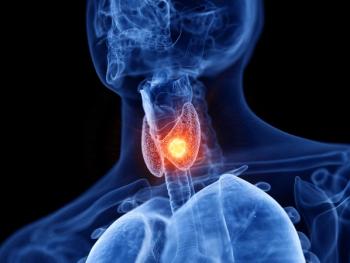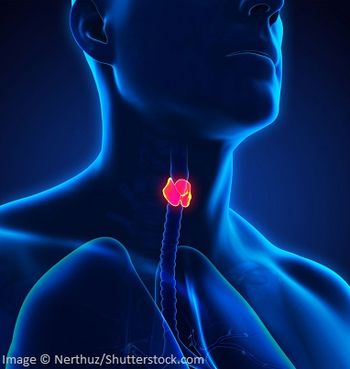
Immunotherapy Patients Should Be Monitored for Destructive Thyroiditis
The risk of immunotherapy-related destructive thyroiditis requires close patient monitoring and can cause permanent hypothyroidism.
The risk of immunotherapy-related destructive thyroiditis requires close patient monitoring and can cause permanent hypothyroidism, according to authors of a retrospective study that was presented at the 86th Annual Meeting of the American Thyroid Association (ATA), held September 21–25 in Denver, Colorado, and
Most cases of immunotherapy-related thyroiditis occurred among patients who were taking immune checkpoint inhibitors that target programmed death 1 (PD-1), either alone or in combination.
“Immunotherapy-related thyroiditis is a unique entity characterized by a rapid development of an asymptomatic thyrotoxic phase followed by a quick transition to hypothyroidism,” said lead study author Priyanka Iyer, MD, of the University of Texas MD Anderson Cancer Center in Houston. “Patients on immunotherapy-especially PD-1 and PD-L1 [programmed death ligand 1] agents-need baseline thyroid function tests [TFTs] and monitoring during treatment.”
Patients who develop thyrotoxicosis while taking anticancer immunotherapeutic agents should undergo TFT monitoring every 2 weeks until hypothyroidism is detected, Iyer advised.
Immunotherapy is rapidly gaining popularity, and new agents are coming into clinical use, yet immunotherapy-related thyroiditis associated with these medications has not been well characterized. Iyer and colleagues therefore retrospectively examined records of 44 patients referred for thyroid dysfunction evaluation while undergoing immunotherapy at MD Anderson between November 2014 and May 2016.
The patients all had normal baseline TFTs but developed thyrotoxicosis and a decline in free T4 (FT4) levels during treatment. The median age of patients was 60 years (range, 21 to 81 years). Patients with a prior history of Graves’ disease, other thyroid disease, or hypothyroidism were not included in the analysis.
Included patients had undergone immunotherapy with a range of agents (13 patients had received nivolumab; another 16 received nivolumab with ipilimumab; 10 received pembrolizumab; and 3 received tremelimumab alone or with durvalumab).
The thyrotoxic phase was characterized by low levels of thyroid stimulating hormone (TSH) and high/normal free thyroxine levels measured directly (FT4). The hypothyroid phase was characterized by low FT4 levels regardless of TSH or low/normal FT4 levels with high TSH. The patients’ median TSH levels during hypothyroid phase was 7.19 mIU/L (range, 0.05–168 mIU/L); the median FT4 level was 0.69 mcg/dL (0.22–0.96 mcg/dL).
Immunotherapy-related thyroiditis was more strongly associated with immune checkpoint blockade agents that target PD-1, whether they were administered alone or in combination with agents that target cytotoxic T-lymphocyte–associated antigen 4 (CTLA-4).
Thyrotoxicosis occurs 1 month after initiating immunotherapy, on average, but onset was noted as quickly as 4 days after the start of treatment. Patients with immunotherapy-related thyroiditis developed early-onset hyperthyroidism “typically followed by subsequent, rapid hypothyroidism,” Iyer noted.
In most cases, thyroiditis appears to be painless; patients in the study had been asymptomatic and did not test positive for thyroid autoantibodies.
After an average thyrotoxic-phase duration of 1 month (2 months after immunotherapy begins), permanent hypothyroidism ensues, necessitating lifelong levothyroxine replacement. Conservative therapy during the thyrotoxic phase was “sufficient,” Iyer said.
“Our case series underscores the importance of routinely assessing TFTs before and during immunotherapy,” Iyer concluded. “As the use of new immunotherapies becomes more prevalent, future guidelines should incorporate recommendations to manage this entity.”
References:
1. Iyer P, Cabanillas M, Waguspack S, et al. Oral abstract 32. Immunotherapy-related destructive thyroiditis: a cancer center experience. Thyroid. 2016;26(suppl 1).
Newsletter
Stay up to date on recent advances in the multidisciplinary approach to cancer.





































